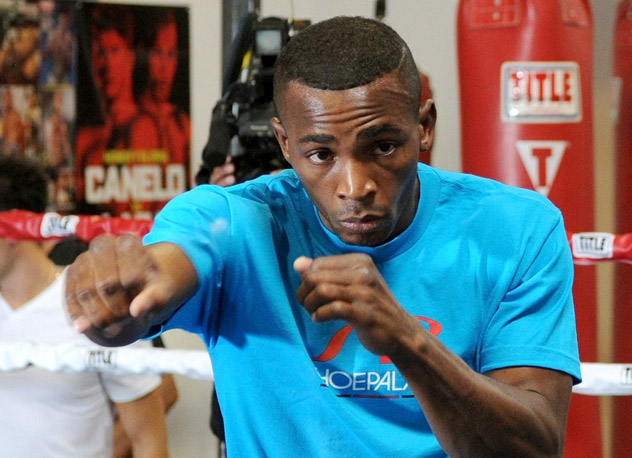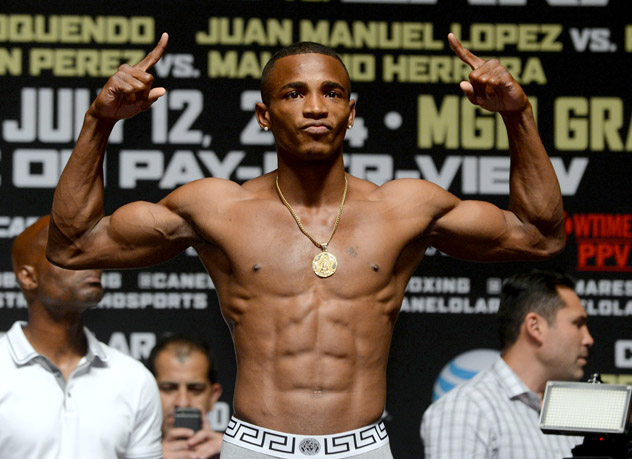Erislandy Lara the latest Cuban defector to reach the pinnacle


Erislandy Lara at the weigh-in for his matchup with Canelo Alvarez. Photo by Naoki Fukuda.
For over 30 years, we watched many of the very best amateur boxers at the Olympics knowing we’d never see them perform in the professional game.
However, things began to change when reigning Olympic champions Odlanier Solis, Yuriorkis Gamboa and Yan Barthelemy stunningly decided to defect from Cuba.
All three defected in December of of 2006. Gamboa and Barthelemy were fighting in America by October of the following year. It took Solis a little longer as he continued to fight in Europe until January 2009, largely due to there being more opportunities for a heavyweight in Europe, a stark contrast from bygone years.
It looked to be a one-off until Guillermo Rigondeaux and Erislandy Lara attempted to do the same. They were foiled in July 2007 before finally defecting successfully in February 2009.
In the previous 30 or so years, there had been a sprinkling of top Cubans to turn pro. The only one of recent note was Joel Casamayor, who won gold at the 1996 Olympics before going on to win world titles in two weight classes. Yoan Pablo Hernandez, who defected in 2005, is still active and currently holds the RING and IBF cruiserweight titles.
Solis, Gamboa, and Barthelemy, and then Lara and Rigondeaux, were a real coup to the pro game. Between them, they had won five Olympic gold medals, seven world championships and 23 national championships.
Since they opened the gates, more and more Cuban fighters are now fighting professionally.
There are many reasons why these fighters have left their homeland to turn professional, including the need to support their families and provide a better way of life, respect and even fame and fortune if they strike it big.
The aforementioned trio left their training base in Venezuela, heading to Germany before applying for an American visa.
“Actually, we hadn’t exactly planned it very thoroughly,” said Gamboa, who at one time held two titles at featherweight but was stripped because of weight issues. “It just happened when we got the chance to leave the team.
“My main problem was that I didn’t feel worshipped. We had won Olympic gold for our country but I didn’t even have enough money to buy a birthday present for my daughter. I asked myself, why should I stay in a country where the ruling class doesn’t care about me even though I represent my country in the best possible way? It just didn’t seem to make any sense.”
Unbeaten heavyweight Luis Ortiz left for different reasons: “I left Cuba with a dream in my mind, to come to America and become champion of the world.”
It was a matter of necessity for former Olympian Luis Franco: “I decided to defect and come to the United States in 2008 after being banned from further amateur boxing by the government of Cuba.”
Each one had to make the heart-wrenching decision to leave Cuba for good, leaving friends and family to pursue their goals in the professional game.
Former 2005 world amateur champion Lara, who campaigns in the talent laden junior middleweight division and faces Canelo Alvarez tonight in Las Vegas, says, “I haven’t seen any of my family or friends from back home. I miss them a lot, but they understand my position. And I fight everyday to better their lives and one day see them.”
It was an arduous journey for Franco: “I travelled by boat from Cuba to Cancun, Mexico. From Cancun, I travelled by airplane and automobile to Texas where I presented myself to U.S. immigration authorities, seeking asylum.”
It was the very same journey many of his countrymen undertook.
Things are tough under Raul Castro’s administration (as they were under his predecessor and older brother, Fidel) with few avenues open to Cuban youth. Many opt to box, where they are looked after and get opportunities to travel the world.
From a young age, Solis became involved in boxing. “We didn’t have many different choices in Cuba,” he said. “If you wanted to make something and be somebody, you had to get involved in sports.
“When I first entered a boxing gym, the coaches immediately told me that this is what I was born to do. They saw something special and made me work hard to exploit my talent in the best possible way. So I got hooked to it.”
Like many children, Gamboa wanted to follow in his father’s footsteps: “I followed him to the gym and started hitting the sandbags. I wanted to be like him. That’s how I fell in love with the sport.”
Rigondeaux, a two-time Olympic gold medalist and the current RING, WBO and WBA junior featherweight champion, also had it tough, “I used to pull large tanks of water for many miles to my family home from the village,” he said “So I think that’s where I got my base strength.”
He realised he needed to make the national team to make life a little easier. “In Cuba, if you don’t get on the national team, life is very difficult so when I joined boxing, first I found it very natural and spent most of my days practicing.” said Rigondeaux.
Cruiserweight kingpin Hernandez has a similar tale. “It was not so easy. As a kid, I had a few problems,” he said. “We had not so much money, so sometimes I went to school without shoes or with homemade slippers. Sometimes I didn’t go because it was awkward for me but later, as a young fighter, I saw a lot of the world. That was a big motivation and helped me.”
The vast majority of these Cuban expatriates now live in Miami, where life is light years different from what they are used to. Living in Dade County appears to agree with Gamboa. “You cannot compare living in the United States to living in Cuba,” he said. “It is just completely different but I am happy that I was able to reunite with a lot of Cuban friends in Miami. It feels great to live here.”
There is an exception to every rule; in this case, it’s Hernandez, who moved to Europe and signed with German powerhouse Sauerland Event. Hernandez likes living in Germany. where he has a girlfriend and a child. “Not every guy from Cuba is the same,” he said “Everyone has his goals and everyone has got his place where he likes to stay. I felt that I’m able to achieve my dreams and goals in Germany.”
Of course, all the current cruiserweight champions are based in Europe, so being there has its obvious advantages.
Being a Cuban amateur brings its own pressures. “As a Cuban boxer, losing is not an option,” Gamboa said. “Whenever you enter a tournament, you enter to win it.” It’s a mentality he has brought to the pros, beating his first 23 opponents before his recent lose to Terence Crawford.
When asked who was the best fighter of them all, Franco said, “Rigondeaux was certainly the most talented as an amateur.”
Gamboa has an abundance of belief in his fellow Cubans: “There are a lot of excellent Cuban fighters who are ready to take over professional boxing.”
With many of the top Cubans in the pros, we heard “La Bayamesa” (the Cuban national anthem) less than we’re accustomed to at the London Olympics, dipping to four medals (two gold and two bronze) compared to eight in 2008. At last year‘s world championships they fared marginally better, winning five (two gold, two silver and a bronze).
You can see that the talent pool may have been weakened but the amateur system is still thriving and will continue to. We can only hope that the top Cubans continue to find their way to the pro game.















